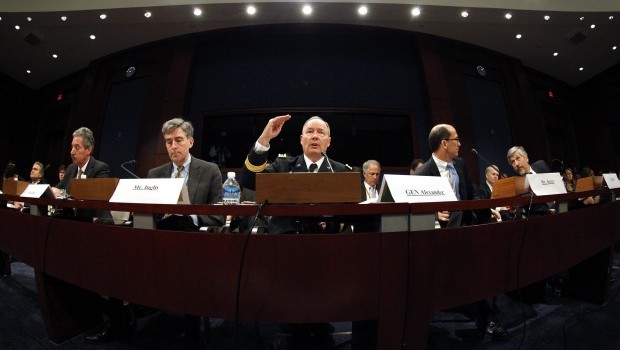
NSA Director US Army Gen. Keith Alexander, center, testifies before a US House Permanent Select Committee on Intelligence hearing on recently disclosed NSA surveillance programs at the US Capitol in Washington on June 18, 2013. (Reuters/Jonathan Ernst)
Washington, AP—The director of the National Security Agency said Tuesday the US government’s sweeping surveillance programs have foiled some 50 terrorist plots worldwide, including one directed at the New York Stock Exchange, in a forceful defense of the spy operations.
Army Gen. Keith Alexander said the two recently disclosed programs—one that gathers US phone records and another that is designed to track the use of US-based Internet servers by foreigners with possible links to terrorism—are critical in the terrorism fight.
Alexander, seated side by side with top officials from the FBI and Justice Department at a rare, open congressional hearing, described how the operations work under questioning from members of the House Intelligence Committee who displayed a supportive demeanor. The officials as well as members of the panel repeatedly bemoaned the leaks by Edward Snowden, a 29-year-old former contractor.
Alexander said Snowden’s leaks have caused “irreversible and significant damage to this nation” that also undermined the US relationship with its allies.
Asked what was next for Snowden, Sean Joyce, deputy director of the Federal Bureau of Investigation, said simply, “Justice.”
Intelligence officials last week disclosed some details on two thwarted attacks—one targeting the New York subway system, one to bomb a Danish newspaper office that had published the cartoon depictions of the Prophet Mohammad. Alexander and Joyce offered additional details on two other foiled plots, including one targeting Wall Street.
Under questioning, Joyce said the NSA was able to identify an extremist in Yemen who was in touch with an individual in Kansas City, Missouri. They were able to identify co-conspirators and thwart a plot to bomb the New York Stock Exchange.
Joyce also said a terrorist financier inside the US was identified and arrested in October 2007, thanks to a phone record provided by the NSA. The individual was making phone calls to a known designated terrorist group overseas.
Rep. Mac Thornberry, a Republican, asked if that country was Somalia, which Joyce confirmed, though he said US counterterrorist activities in that country are classified.
The programs “assist the intelligence community to connect the dots,” Alexander told the committee. He said the intelligence community would provide the committees with more specifics on the 50 cases as well as the exact numbers on foiled plots in Europe.
Alexander said the Internet program had helped stop 90 percent of the 50-plus plots he described. He said just over 10 of the plots thwarted had a connection inside the US, and most were helped by the review of the phone records.
Alexander got no disagreement from the leaders of the panel, who have been outspoken in backing the programs since Snowden disclosed information to The Washington Post and the Guardian newspapers.
Representative Mike Rogers, R-Michigan, the Republican chairman of the committee, and Rep. C.A. Dutch Ruppersberger, the panel’s top Democrat, said the programs were vital to the intelligence community and assailed Snowden’s actions as criminal.
“It is at times like these where our enemies within become almost as damaging as our enemies on the outside,” Rogers said.
Ruppersberger said the “brazen disclosures” put the United States and its allies at risk.
Committee members were incredulous about the scope of the information that Snowden was able to access and then disclose.
Alexander said Snowden had worked for 12 months in an information technology position at the NSA office in Hawaii under another contract preceding his three-month contract with Booz Allen.
“Egregious, egregious leaks,” Joyce said.
The general counsel for the intelligence community said the NSA cannot target phone conversations between callers inside the US—even if one of those callers was someone who was targeted for surveillance when outside the country.
The director of national intelligence’s legal chief, Robert S. Litt, said that if the NSA finds it has accidentally gathered a phone call by a target who had traveled into the US without their knowledge, they have to “purge” that from their system. The same goes for an accidental collection of any conversation because of an error.
Litt said those incidents are then reported to the Foreign Intelligence Surveillance Court, which “pushes back” and asks how it happened, and what the NSA is doing to fix the problem so it doesn’t happen again.
Deputy NSA Director Chris Inglis said a limited number of officials at the agency could authorize dissemination of information to the FBI related to a US citizen, and only after determining it was necessary to understand a counterterrorism issue. Information related to an American who is found not to be relevant to a counterterrorism investigation must be destroyed, he added.
Alexander said there were 10 people involved in that process, including himself and Inglis.
The hearing came the morning after President Barack Obama, who attended the G-8 summit in Ireland, vigorously defended the surveillance programs in a lengthy interview Monday, calling them transparent—even though they are authorized in secret.
